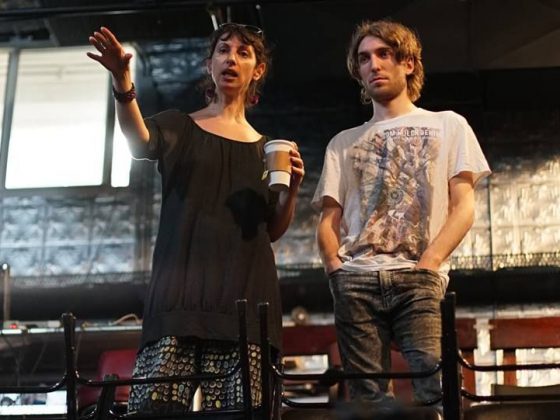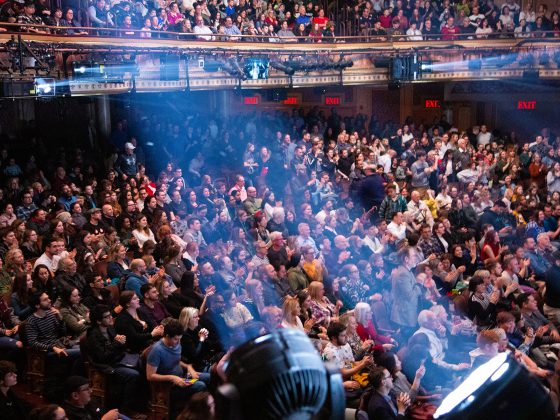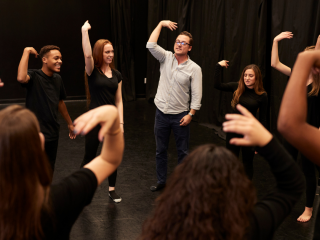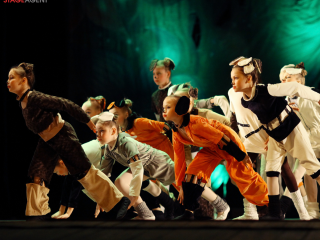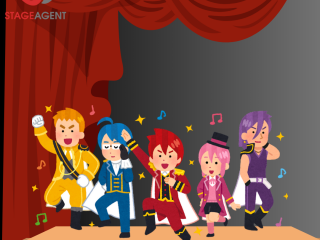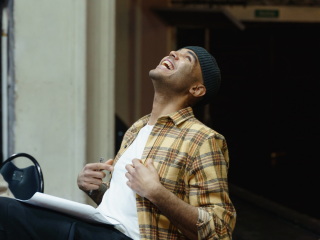This month, I invited a group of high school students to be a part of an interview about theatre kid life, focusing on three main ideas: Why do drama, theatre kid stereotypes, and the drama of drama! All of the interviewees are students who I taught and directed as middle schoolers, who have now moved on to our high school program.
- Scott: Freshman
- Connor: Junior
- Paul: Senior
- Kevin: Senior
- Red: Sophomore
- Dante: Sophomore
*Names have been changed.
WHAT ATTRACTS YOU TO DRAMA?
Scott: Going on stage and being a new person. Just deciding like, “Hey. I’m going to be this other person for a little bit. And just thinking how they think.
Me: I actually really hate public speaking–
Scott: Oh yes, I despise public speaking. But for acting it’s different. I’m not me, I’m a character.
Kevin: Hey! The fourth wall. It protects you from everything. (They laugh.)
Dante: For me, it’s the people, hands down. I’ve met some of my best friends through drama, and every time we show up we have a blast.
Paul: Yeah, I would say less about the acting itself, because yeah, love the acting. But it’s more about the community that comes with drama. You’re creating a show with like-minded people, where everyone has the same goal.
Connor: Uhm, my first kind of exposure to drama was in 6th grade drama club, doing sound. Oh, what a gig that was! (They all laugh.) I think the thing that kept me in it was…coming after school and being with people who are all working toward the same thing. And like now, having been doing it for so long, I know that any work that we do as a team is going to pay off. And we’re going to make something beautiful that we get to show people. Opening night is really the best part, because we get to see the hard work that everyone puts in–and showcase it.
Me: I think what’s really beautiful about what y’all are saying about a shared goal…is that what YOU do is really different than what the lead actor does, is really different than what the set designer does, but it is that team effort–that collaboration to make a unified thing together–
(They all laugh, our program always says:)
Kevin: Unified event!
Paul: A unified event!
Scott: Also the idea of the seniors and upperclassmen being there. The community of having people mentor you and help you along.
WHAT ARE THEATRE KID STEREOTYPES?
Kevin: Well, there’s gay. Which is like–half-true, kind of–
Paul: Yeah, it’s like half-true.
Me: But why is it true?
Kevin: Well I don’t know if I can speak to this because I’m straight. I’m STRAIGHT EVERYONE!
(The others gasp and laugh.) But we have a lot of the LGBTQ community.
Me: But WHY do we have the community?
Kevin: It’s an accepting place where we can be ourselves.
Paul: I think a lot of the stereotype of that comes from–acting is seen as almost flamboyant. And that flamboyance has been seen as being synonymous with being gay. So people on the outside look in and see this flamboyant activity, and if men do it, it’s considered, well that’s gay.
Dante: I mean, there’s nothing wrong with being gay, I’m gay myself, but I think labeling everyone who likes something isn’t great. Nobody should be put into categories based on their interests; we’re all unique and different individuals.
Scott: Personally, as a bi person, the idea that there are no rules in theatre is really attractive. No one is focused on my sexuality. In sports, it’s like a thing. I’m a bi athlete. But in theatre, it’s a more open place, and my identity is just a part of me. I can just exist.
Paul: And part of theatre is like–it’s a place for creative expression. And part of creative expression is how we express our gender.
WHAT’S THE DRAMA IN DRAMA?
Red: Rumors can spread. People love that kinda stuff, it gives them joy. It’s not exclusively a theatre thing, it’s everywhere. But it definitely feels like in the theatre world, it’s more dramatic. It’s a living hell for everyone involved for 5 days and then we all move on.
Me: Connor, is it as dramatic on the tech side of things?
Connor: Uhmmmm…I would imagine it’s worse on the acting side.
(All the actors laugh.)
Kevin: Wow, okay.
Red: Watching people not get cast is really hard. Like I blame myself if I’m cast and they aren’t.
Paul: This is going to sound bad. This is going to sound like an a-hole thing to say. But the hardest part for me, as a freshman getting a lead role–was knowing that people were like, “Oh he just walked out here and got the lead–”
Me: Kevin, is that true? Is that how people felt?
Kevin: Paul…are you okay with me…?
Paul: Yeah, of course.
Kevin: 100% yeah. I remember at the time being like, “Okay he’s a great actor,” but yes a part of me was jealous. I never said anything–
Me: Cause you’re a professional. But y’all realize–the leads don’t cast themselves, right? Your directors make these decisions. So while I think feelings of disappointment and jealousy are totally valid, taking those feelings out on the lead or whoever gets cast is like…very misdirected. Plus, different shows call for different things.
Scott: Yeah, the second year in a row when I got a “lead” in middle school, people said things like, “he already got to do this.” Someone genuinely got mad at me.
Me: When you’re looking at your teachers, who are your directors and your educators, what should we be prioritizing? What year you are, the quality of your audition, the work you’ve done in the past, or what energy you bring to the team?
Connor: I mean, you have all these people where you’ve seen what they’ve done before. And then new people who you have no preconceived notions about…I don’t know.
Me: What about in tech? What if there’s a freshman lighting prodigy when you’re a senior? Who comes in knowing more than you do? …Unlikely, you kind of are that prodigy, but you know what I mean.
Connor: I think we could work together.
Kevin: I mean, I think taking into account people’s history is a double-edged sword. Because I keep getting compared to the Kevin I was freshman year, but that’s not the kind of acting I do anymore. Like I’m not going to do all this crazy movement stuff. I’m not that person anymore, so I’m different as an actor.
Me: But like–you CAN do those things. And the show might call for it.
Kevin: Right but–when you know what they can do, unless they REALLY come in and surprise you, you know where you’re going to put them. “These are the roles that are available to them,” even if they could have done something else you hadn’t considered.
Me: Sure. On the flip side–when you walk into an audition, you are presenting us with your instrument. And even if, in your mind, you don’t want these charactery, movement-based roles–you having the ability to do them is a huge asset. It’s possible that if you hold back that skill set because you only want to be considered for a certain role, you may not end up cast at all.
Red: I think if I saw a kid who I already knew–and they give me a 60% fit for a role, and a kid I don’t know give me an 80% fit—I’d pick the new kid.
Me: Well y’all know I love a 6th grade lead.
Red: Well, and I think that you directors get a lot of hate that you don’t hear–
Me: I mean, we know about it.
Red: Like I’ve heard that I only got leads in middle school because I’m “your favorite”–
Me: I’ve heard that too–AND IT’S TRUE! (They all laugh.) Kidding.
Red: But that stung, you know, because I earned those roles.
Me: Of course you did.
Kevin: Lead culture, man.
All: Lead culture.
(We realize we’ve been talking for far longer than anticipated, the interview derails into their celebrations of the latest cast list. They leave. We wish each other a lovely weekend.)
What did I find out from these interviews? As expected, many kids are drawn to theatre because of its inclusive community. Theatre kids are well-aware of the “gay” stereotype that comes with theatre, and they’re polarized by it. On one hand, they love their community and many of them do identify as one of the letters in LGBTQ+. However, they understand that that stereotype is often coming from a place of stigma, and that all stereotypes can carry inherent harm.
And, unsurprisingly, the drama in drama often comes from casting and leadership positions. Who deserves what, who got what and why. I found the conversation super informative, because it was an interesting look into the high school balance of ego and humility, their understanding of “type” and to what degree typecasting is changing, and their ideas about what is fair. For some, their desire to break out of their box of expectation, and for others: trying to craft a new box to fit into.
Overall, what a smart, loving, vulnerable group. Having known them in 6th grade, seeing some of them as seniors, I envision the wonderful humans I’m only beginning to know. Theatre kids continue to be, as always, wonderful.



